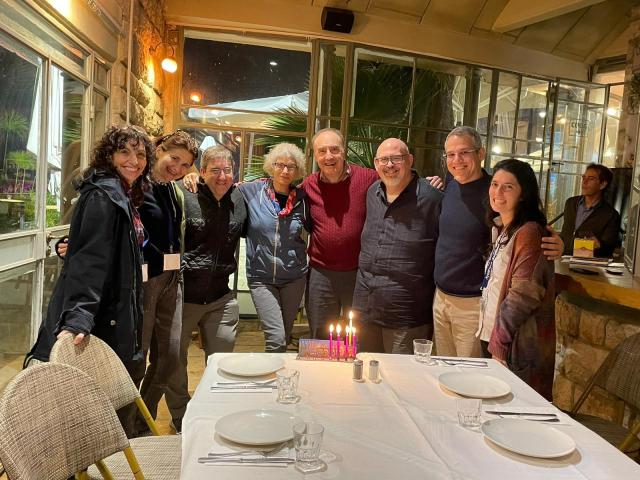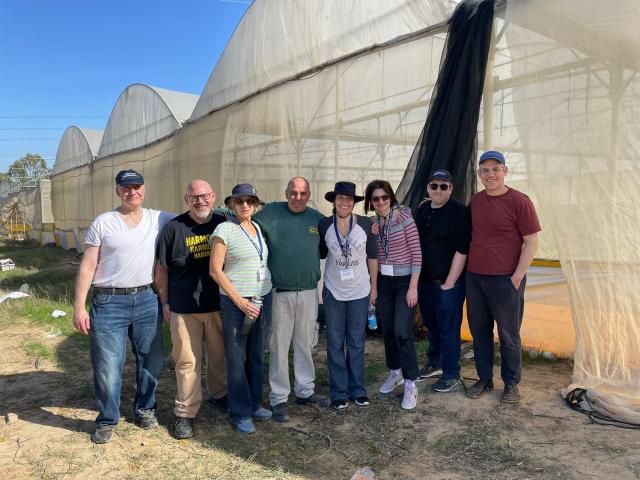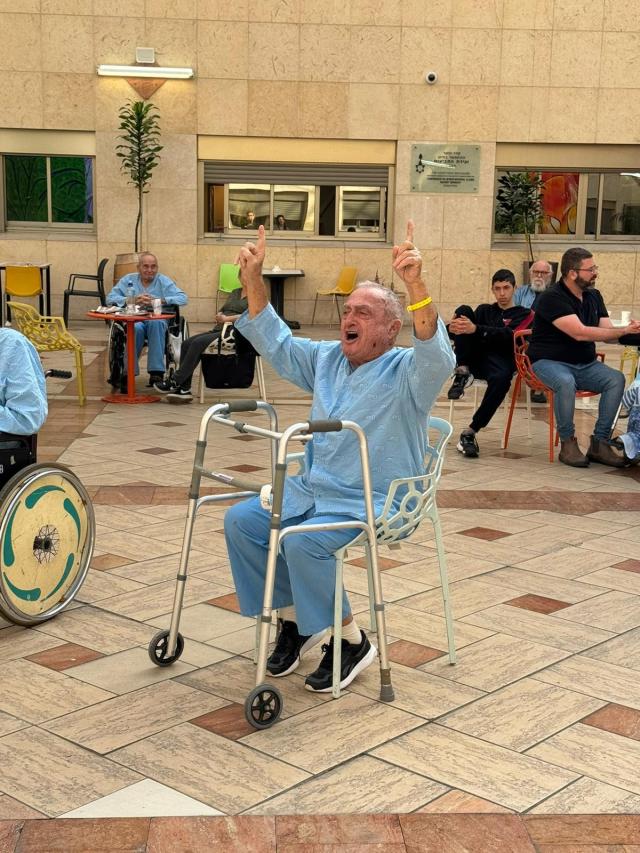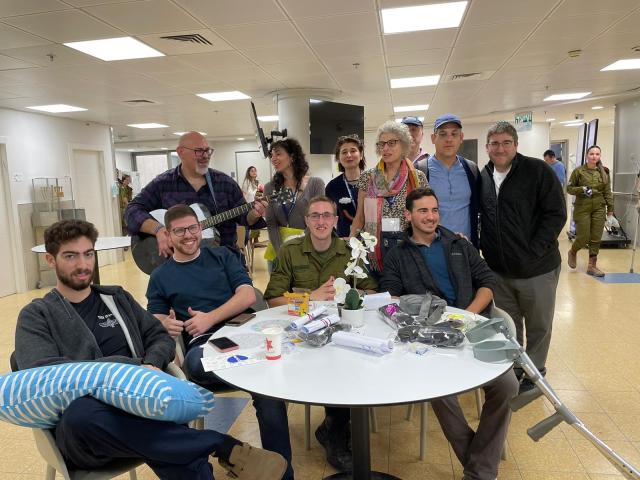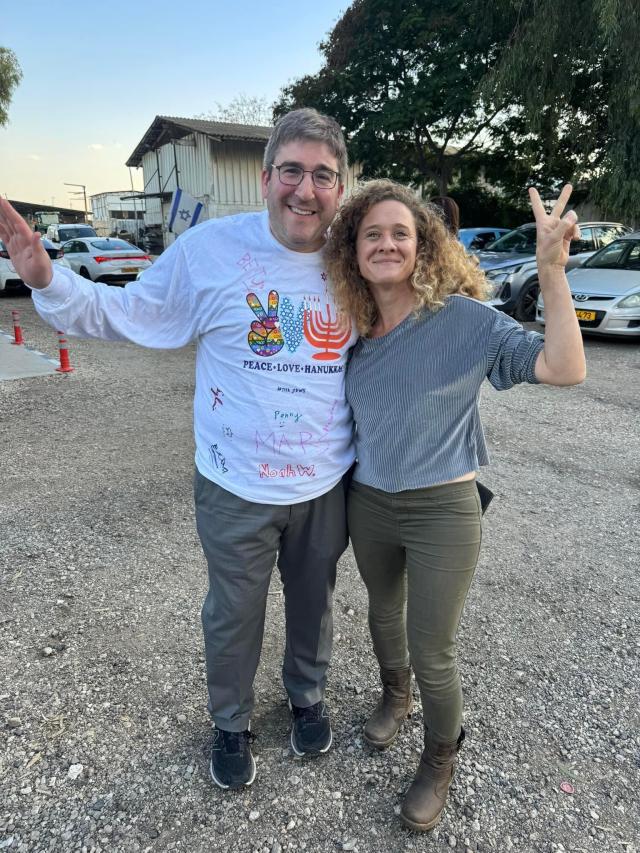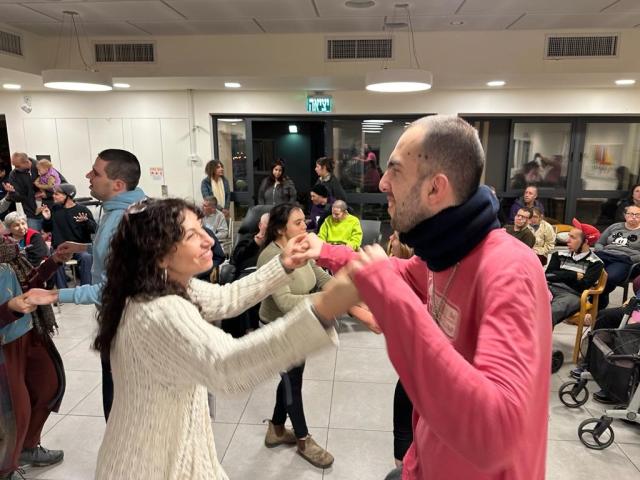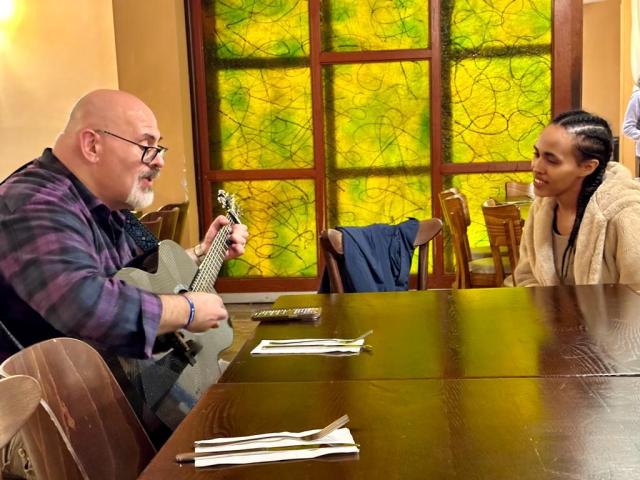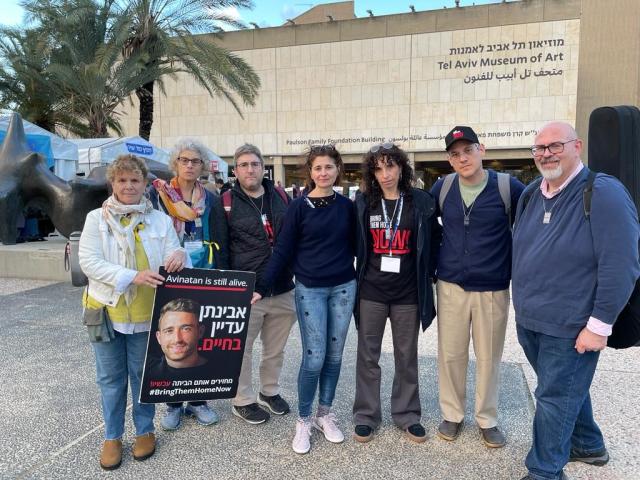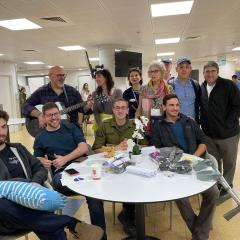
ACC Israel Solidarity Trip Journal
Introduction:
I am not one who normally keeps a journal. But it doesn’t take much imagination to recognize that this is a moment in the history of our people that will be remembered in infamy. I am acutely aware that I have been given a rare opportunity to be a witness of this moment. One day I will look back on this time and know with absolute certainty where I was, what I did and what I saw. So, I wrote a journal - not for myself, but to be shared.
It is impossible to capture all the emotions of these four days. All that I saw and felt, the tears I shed and couldn’t shed - some things were too horrific to hear without putting up a protective shield around my heart - a learned skill of all K’lei Kodesh in order to be able to be fully present as we are needed at the most difficult moments in life.
I cannot tell this story without mentioning the phenomenal Cantors that went with me on this journey - every one of them brilliant, compassionate, thoughtful, and utterly human. We will always be bound by what we experienced together. My eternal gratitude to Cantors Jason Kaufman, Juval Porat, Laura Croen, Mark Perman, our talented pied piper Brad Hyman, and of course my roomie Irena Altshul. And my gratitude goes to Rachel Roth, Doron Epstein at Ayelet Tours, and the entire ACC board, and to my congregation, Brooklyn Heights Synagogue, for making this important trip possible.
Also needing mention is our young and lovely guide, Talia. This experience was a first for her as well - not a tourist venture in the normal sense, but a carefully crafted schedule of witnessing, listening, comforting, and bringing joy where it would be welcome. That she is incredibly well educated in the history of Israel was to be expected, but she was unexpectedly the right personality for this type of trip - her empathy and ability to read the moment and help us bridge language and cultural barriers to connect with the Israelis we met with was incredible.
Enough preamble. The journey begins.
* * *
12/9/2023
On the plane. Boarding with El Al was its usual chaotic experience. Everyone lines up all at once, no matter what zone they’re in, and before half the plane is full, they announce they are closing the doors in 5 minutes - I imagine to discourage stragglers!
After the usual exercise of seat swapping has taken place, I find myself very far from my stowed bag, but it’s worth it as I’ve snagged a window seat. My seat mate has downed several pills (I can only assume Dramamine and vitamin C) after disinfecting her entire area, and is fully equipped to sleep soundly. I follow suit, accepting I won’t be able to get to the bathroom all flight and settle in for an uninterrupted night.
It’s the 3rd night of Chanukah.
* * *
12/10/2023
After managing a few hours of sleep on the plane, we are landing. Somewhere in the skies over the Adriatic Sea I passed my son Rafa as he flew home from Greece. I waved - as promised - but I don’t think he saw me.
It’s midday now in Israel and as I see out the plane window the approaching coast, I strain to see further down into Gaza. I don’t know what I expected - signs of warfare, explosions in the distance - but all is quiet, masked by a layer of low clouds. Below the outskirts of Tel Aviv look as normal as always - busy roads framed by lush green fields. Tel Aviv’s tall buildings rise out of the mist as we land.
We touch down safely as everyone applauds. The Ben Gurion International airport is eerily quiet. Only El Al planes are parked and waiting. The flight was full, but even our number doesn’t hide that the once bustling airport is nearly empty. The “kidnapped” posters hang along the path rails, and new signage clearly marking the location of bomb shelters is visible.
But the mood of the disembarking passengers is happy and excited. We’re all just so happy to be home.
We meet our guide, Talia, an American who made Aliyah. We drive to Jerusalem and sing Jerusalem of Gold on the bus as we enter the city - right at sunset - just in time to see the Chanukiah candles being lit - well - everywhere.
* * *
We make a stop at Hamal Yerushalmi https://www.onelevjlm.org/, the largest of 25 war rooms all over the country. It was set in motion by noon on October 7, and responding to need by 7PM on the same day - the first and most urgent need being transportation of troops to Gaza. Our host, Adir Schwartz, explained to us that while the government has taken over much of the need-based aid to evacuees, the response of the government took weeks to ramp up. Their volunteer group was answering the call within hours. Even now they fill needs that do not fall into a government category - like mini fridges for soldiers in their hospital rooms, so the food they are donated doesn’t spoil and serving the evacuees that left home voluntarily out of fear, who do not qualify for government aid.
The thing that sticks with me most is that Adir first thanked American Jewry. He said the worst thing at a moment like this is to feel alone - and that they have not felt alone for even a moment. Despite there being a rift with American Jewry before October 7, by the 8th they were receiving donations that have exceeded 10 million shekels distributed. That was heartwarming to be sure.
Then he said how badly Israelis feel for American Jews - that we are hiding our mezuzahs, taking off our kippot in public, feeling threatened at rallies and universities. And that we are alone - we don’t have an army to protect us.
* * *
We arrive at the Dan Panorama hotel in Jerusalem, which is housing evacuees from Moshav Yakhini and the town of S’derot, both in southern Israel. The hotel concierge that greets us assures us we were not taking any rooms from anyone that needs them. As we watched a resident come out of the elevator with his dog on a leash, he smiled and went on to say that for the last two months they have all become family - eating together, housing pets and children, and being community for each other.
* * *
We are welcomed at the Jerusalem Botanical Gardens for a wonderful dinner. We are joined by a local Reform Cantor, and a young IDF Captain and his wife for conversation and our own candle lighting.
It’s the 4th night of Chanukah.
* * *
12/11/2023
After a typical feast of the Israeli buffet breakfast at the hotel we’re off bright and early to the Gaza envelope. We will be volunteering at a farm in the town of Zimrat. The farmer’s name is David Cohen, and he has no one to help him care for his plants.
As we near the farm we pass a new sort of “cemetery." It’s a collection of cars - cars from the Nova music festival site, cars from the raided Kibbutzim - some intact, many burned and piled on top of each other. It’s not a memorial - Israel is not ready to make memorials yet. It is an open wound.
We enter Zimrat and observe that every bus station has a cheerfully painted thick concrete structure next to it. Each one is a bomb shelter - each built without a door.
Inside Zimrat there are no people, only military vehicles and personnel pass on the main road. Sukkas stand abandoned and never taken down - two months after Sukkot. There are pomegranate trees full of rotting fruit, and lemon and orange trees equally abandoned, their fruit left to ripen and spoil on the trees.
We are there to help growing eggplant plants in the greenhouse for three hours. We are close to the northern part of Gaza, and our work is punctuated by the frequent sound of artillery blasts and helicopters. We can see the smoke plumes rising from Gaza in the distance.
The farmer is of Tunisian descent and had been on that farm his whole life. He told us about his brother, an IDF veteran, who lost his leg to a Hamas bomb on October 7. David tells us that when he saw his brother, Issachar, in the hospital, he began to weep for the lost leg. Issachar comforted him, saying, “I’m fine - what is a leg compared to a life?”
He told us that prior to the התנתקות - the disengagement - in 2005, Palestinian families would come daily to his farm to work - a father would bring his eight sons - and they would all profit from the relationship. That all ended in 2005 - and now he swears he will never have Palestinians working on his farm - ever again.
This is how I learn that Hamas got detailed information on the layout of the Kibbutzim they attacked from the workers that were let in every day. We sing for him before we leave - Ozi v’Zimrat Yah - God is my strength and song.
* * *
After a quick bite to eat we stop in Ziyadna - a Bedouin settlement where four of the hostages made their home. We met with the men first and they offer us water and a hot drink. They are all from the same family - the Ziyadna family. One of their members, Youssef, had been hired to transport seven young party goers to the Nova festival - and when he received frantic texts he drove to the rescue. He crammed 31 people into his van, and drove across fields, followed by others in their cars, saving their lives. Bedouins who choose to serve in the IDF are renowned for their tracking skills.
Four family members were working in one of the Kibbutzim when they were taken. The two youngest teenagers, Bilal and Aisha, have since been returned. They reported having been given enough to eat, a bed to sleep on, and a Quran. But Bilal was withdrawn, and despite being brought out to meet us, clearly did not wish to be there. We women are permitted to meet with the Bedouin women, as they are not permitted to speak with men who are not family. We meet Aisha, and see that all the women are wearing black - and would be till Yousef and Hamza are returned. They are both fathers, Yousef is the father of 19 children from two women, and grandfather to 43 children. We brought the children gifts of toys and candy.
We learned that Bedouins are Muslims, who are determined to preserve their agricultural and autonomous lifestyle. Their village is not officially recognized by Israel, and they resist what they feel would be forced assimilation into Israeli society. Israelis view them as exploitative of the land, a perspective that was on display, as we had to drive past the piles and piles of garbage the Bedouins abandon by the side of the road on the way to their village. We sit with them and listen respectfully and thank them for their willingness to speak with us. It is clear that they are worried their kidnapped family members will not be as prioritized as Jewish hostages.
* * *
From the Bedouin village we make a stop at the site of the Nova music festival massacre. There are soldiers posted nearby, and we give them some of the clothes - mostly socks and undergarments - that we brought from America. As we approach the site, I see there are makeshift memorials among the trees and in the clearing at the site - posts in the ground with a picture of each person killed. There’s a banner with all their names and another with a special mourners kaddish. The soldier giving us access to the site warns that the black spots on the ground are the remnants of burned items now removed - maybe cars, maybe people. We gather as a family recites the mourners kaddish and respond appropriately, adding our customary song Oseh Shalom. Then we spread out.
Cantor Hyman brought his guitar from the bus, and I asked him to play Karduner’s setting of Shir Lama’lot. I didn’t know then that the song has become an unofficial anthem since October 7 - only that Psalm 150 comforts me when I’m in distress. “I lift my eyes to the hills; from where does my strength come? My strength comes from God, maker of heaven and earth.” We quietly sing it together, and as we do, two young soldiers visiting the site join us and quietly sing with us. When the song is over, we separate, no words, no looks exchanged. It’s time to go.
* * *
We arrive at Moshav Shokeda - a base is set up where more than 1,000 soldiers cycle in and out all day. There volunteers serve them food, have a cheerful little fire pit with chairs around it, and have even set up a place where they can drop off laundry to be done.
https://www.facebook.com/RonforLoneSoldiers?mibextid=hrBMPu
We light candles, sing chanukah songs, and joke around with the young soldiers. We break bread together, and meet soldiers from New Jersey and Queens, as well as Israeli ones of course. Most are reservists, but they all look very young to me. One soldier - Or (meaning “light”) - tells us that his unit is tasked with going into a battle zone to retrieve the body parts of fallen soldiers, often under fire.
It is an important release for us - to comfort ourselves too - to sing among the cheerfully decorated trees and munch freshly powdered sufganiyot - all while studiously ignoring that the soldiers never put down their guns, and that all around us is the steady sound of nearby artillery falling. We finally have to leave for the long drive back to Jerusalem, but I know I left a piece of myself there. I think we all did.
It’s the 5th night of Chanukah.
* * *
12/12/2023
We check out of our hotel in Jerusalem and start the day with a meeting with Gil Hoffman - the Executive Director of Honest Reporting: https://honestreporting.com/ - a news site dedicated to watching how accurately mainstream news corporations report truth. He visited Brooklyn Heights Synagogue just a few weeks ago as a guest of JNF, and I missed him then. But after spending an hour hearing him talk and having him answer our questions, I immediately signed up for his newsletter. One thing was clear, we have no time left to get a major victory in this war. With Hamas still able to fire rockets at Tel Aviv, only one hostage rescued, and no Hamas officials with name recognition eliminated, we cannot claim a victory. The war has been going poorly.
* * *
We are back on the bus and on our way to Tel HaShomer hospital in Ramat Gan. We will visit some of the more than 2,000 soldiers injured in the war. I have so many sweet cards written by our fifth graders that I share them around with my colleagues to give to the soldiers.
We arrived at the hospital but the person who was supposed to meet us has become unreachable. We can only assume some sort of emergency - a safe assumption these days. We arrive unannounced at the orthopedic and rehabilitation wing and pause in the main atrium where many elderly patients are sitting and passing the time with family members. We begin singing for them as our guide, Talia, goes from patient to patient getting song requests. We sing everything from Beetles to Oyfn Pripitchik. They dance in their wheelchairs and sing along - loving every moment.
We break free from the atrium and go upstairs to see wounded soldiers. Here we find a very different energy.
Let me be clear - these are children. They are the same age as my children. Instead of finishing college degrees or making plans for winter break, they are sitting here, wounded in every way imaginable. But the hardest part to see is how somber they are. They are not ready to sing, or talk, or even look at us. We feel out of place and unsure of what to do next. Our wonderful guide, Talia, begins to pass out the cards. Perhaps it is the simple honest sentiments of “stay strong” and “thank you for fighting for Israel,” or maybe it’s how they spelled “Isral,” or even the little drawings of smiley faces and crooked chanukias, the cards are so well received. With the simple blessing of real smiles, the ice is broken, and we’re able to have some honest conversations, sing some songs, and bring some joy.
We leave the hospital feeling sad, depleted, helpless, but mostly angry - that the lives of these children - their trajectory - has been forever altered. Our young guide is teary with relief - grateful she didn’t encounter her little brother, or anyone else she knows.
* * *
We stop for lunch at a cafe that is in “war mode,” with very little variety of food. We are happy to accept whatever they have ready. We are joined by Rabbi Naomi Efrat, the head of tourism for the Israel Movement for Progressive Judaism https://reform.org.il/en/. She was instrumental in making connections for us on this trip. We ask her what she would say to American Jews right now. She says, “We’re in pain. We’re still in pain.” We ask her what she would like American Jews to do. She says one word, “Come.”
We deliver to her the rest of the clothes we brought for soldiers and are once again on our way.
* * *
Our next stop is Kfar Tikva. It is an inclusive kibbutz-like community and Home for Life for over 220 adults with cognitive, developmental, and emotional disabilities. Residents can move in as teenagers and live their entire lives there. It is in a beautiful setting on a hill, and the residents there learn to be independent, to hold down jobs, create art, learn about life and death by caring for animals, they even fall in love and get married, all while living there. The Rabbi we meet with there tells us that last year 80 of them signed a petition that they wanted their own Reform Synagogue. They were gifted a beautiful Torah and have services every other Friday. The Rabbi says that it is not enough for a person to have a comfortable life - they must have a meaningful life.
We’ve come to light candles with the residents and sing songs with them. The singing soon becomes dancing, and we leave feeling uplifted by the gift of their unfiltered joy.
* * *
Our next stop is further north at Zikhron Ya'akov, a town just south of Haifa. It is another location housing evacuees this time from Kiryat Shmona, a city in northern Israel near the Lebanese border, and from S’derot in the south, as well as many Ethiopian immigrants. We light candles with a family with young children, and the children lead us in song, as we sing all their favorite Chanukah songs. They dance in a circle, their faces lit up at this unexpected singalong, as we’re joined by some of the Ethiopian residents. We join the residents for dinner, some of us brave enough to try the spicy Ethiopian food and help clear and reset tables before leaving.
* * *
Finally we arrived at our hotel in Haifa - another Dan Panorama. Leaving the male cantors to fend for themselves, the three female cantors and Talia go to a special and unique Rosh Chodesh gathering of women only. In Haifa, Arabs, Jews, and Christians all live among each other, and have for generations, so it is not surprising that in Haifa, even now, such an interfaith gathering is possible. The setting is a charming and hip old building, there are sweets and hot alcoholic cider, lit by candlelight. There is music and much needed sisterhood. It made me yearn for the possibility of such a gathering back home.
It’s the 6th night of Chanukah.
* * *
12/13/2023
This morning we drive to Kibbutz Shefayim. It is a beautiful and wealthy kibbutz that is housing the survivors of Kfar Aza. This community was less than two miles from Gaza, and the first to be hit on the morning of October 7. We meet with Amlas Chen Kotler, a woman whose aunt and uncle founded the community of 700 people. She herself grew up there, was raised in their communal children’s house, and has lived her entire life there. She survived the attack because she happened to be visiting her sister in Portugal. We sit and listen as she tells us a first-hand account of the horrors that occurred.
She was awakened on October 7 to alarms going off on her phone that there is a security breach, and that her father, who is elderly, is alone in the fields outside the village. She tells him to call the security officer, one of her oldest friends and neighbors, to pick him up in a cart and bring him home. He calls her again to tell her he’s in his home, and as she is on the phone with him, she hears shouting in Arabic. She tells him to hide in his safe room. As we have all heard by now, all the safe rooms are designed to protect from bombs, not terrorist infiltration, something which was not imagined before now. None of the doors were lockable, and most were made of flimsy material. No one ever needs to lock their doors in Kfar Aza.
She told us how all day she tried to respond to desperate messages on the group WhatsApp chats, as her hands are free to respond. There are messages pleading for help. The messages become less frequent as hands are needed to hold doors shut, and many stop messaging altogether.
She tells us how the attacks came in three waves. The first wave has orders to kill whomever they see. They had been told that everyone, whether elderly, woman, or child, is a militant and should be killed on sight. This wave of terrorists had detailed knowledge of the layout of the village and set up an ambush for the residents around the weapon storage unit. Several of the village security detail are killed and wounded in the ambush included her lifelong friend. Over 60 people were murdered.
The second wave came a couple of hours later. They came to take hostages. Seventeen people, including children and seniors, were taken.
The third wave came in the form of Palestinian looters, who came and took whatever they wanted.
Many of the homes are burned. It took the IDF two days to clear the village of terrorists. Chen Kotler returns to see her lifelong friends in body bags, lined up on the ground.
She tells us how on October 7 no rescue came. No soldiers, no tanks, no airplanes. No one. How on October 7 she put her emotions in a box. How she put her desire for peace in another box. She has not wept. She has to remind herself to eat and to sleep. Her entire focus is on getting the missing ones home and making sure that whoever will listen will know what really happened to her home. She can’t imagine how they will ever return to Kfar Aza, as it is the site of the murders of her friends and family.
We stay there for most of the morning. We watch her slides, we hear her testimony. We don’t ask questions, we just listen. When she is finished, we ask only if she’d be willing to share her story again. She is. Laura asks her if she’ll accept a hug. She does.
* * *
I am fortunate enough to get a break in the form of lunch with my uncle and cousins, one of whom is serving in the IDF Airforce HQ. They are funny and smart in the unique way all Porzecanskis are (very dry and a little dark). I want to hold them tight, but like all Porzecanskis, they aren’t big huggers. We talk a little about the war, but also about family, jobs, and life in general. We enjoy lunch at B-Side, a pub near Sarona market in Tel Aviv, followed by ice-cream in the market, and a history lesson about the Templer heritage homes near the market. A visit with my uncle is not complete without a little history lesson.
I pass them a suitcase of baby clothes sent through me from my cousin in New York to be passed to her sister-in-law in Ramat Gan who is pregnant and alone while her husband is fighting. We part ways and they ask me to come back soon. I know without a doubt I will.
* * *
I meet back up with our group after our lunch break, and Talia is passing out Krembos, the Israeli version of Mallomars. I accept the extra sugar, as I know what is coming next.
We walk to the headquarters of the hostage task force. With very little government interaction, information, or support, the families of the hostages banded together, and with the help of volunteers and donations, have created a massive campaign to keep their stolen ones in the forefront at all times. The level of organization is stunning. We are guided into an auditorium where two of the families are willing to speak with us. Their pain is palpable, their shock, their determination, their desperation. The return of the hostages during the ceasefire gave them hope but deepened their sense of urgency. As they heard of the conditions their loved ones are being held in, saw how much weight the returned ones had lost, they understood that time is running out with every passing minute.
After hearing them speak I feel compelled to assure them that the faces of their loved ones are everywhere in America. That they are prominently displayed in our synagogues. That we hold an empty seat for a hostage on our bimah at Shabbat service, and at Shabbat tables in our homes. That we wear the blue ribbons of solidarity.
That we will not forget them, we will not let the world forget them, and that we are Am Echad - One People.
We share our e-mails with them, so that whatever they ask of us, we can try to make happen in our home communities.
* * *
After this, we walked to Hostage Square. In a plaza that is normally the center of art and culture in Tel Aviv stands a long table. It stretches across the entire square. It is draped in a white tablecloth, the places are beautifully set and there are flowers on each place setting. The chairs are empty. Empty seats at the Shabbat table, one for each hostage.
Every day people come and gather, and every afternoon, there is music and prayer. This afternoon we are bringing the music. We start singing nostalgic favorites, like Lu Y’hi and Al Kol Eileh. The crowd gathers, and we see smiles, swaying, and nods of recognition as the gathered people sing along with us. By now we are accustomed to singing together, and we move seamlessly from one song to the next.
* * *
We leave Hostage Square and head to our last dinner in Old Jaffa. We are seated at a beautiful restaurant called Kalamata and are treated to a delicious fish-themed dinner. We light candles and include the Shehecheyanu in our prayer. We all feel deep gratitude: for each other, our guide, and the privilege of participating in this trip. Gratitude for the way Israelis in deep pain were willing to speak to us so candidly, letting us into the most private and horrific moments of their worst nightmares.
It’s the 7th night of Chanukah.
* * *
Epilogue:
I’m sitting in my window seat of another full El Al flight. I watch the night lights of Israel disappear outside my window - praying it will still be there for me to return to.
Knowing that it is not by might, not by power, but by the spirit of Am Yisrael will we triumph.


